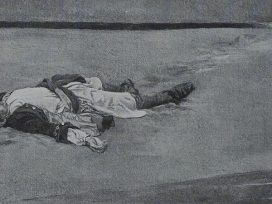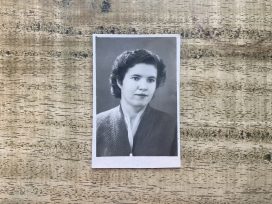‘Akana tumenge phenava, sar oda čačhes sas la Marikaha – Now, I’ll tell you how it really was with Marika.’ Babika interrupts the revelry in a voice that rings out in the clear tones of a bell. The violins fall silent. The women stop singing and everyone takes a seat. Cikno rushes up to throw a twig onto the fire in the hope that since he is helping granny so eagerly, she will let him listen. Sadly for him, the other children haul him away with the firm command that if they have to go to bed, so does he.
Babika looks back at the children, a little annoyed, and calls to her eldest granddaughter: ‘Hanya, phen le čhavenge odi paramisi pal e jagori the o pusoro – Hanya, tell the children the fairy tale about the flame and the straw.’ She smiles and says as if to herself: ‘Nane čhave, nane bacht – No children, no happiness.’ She sets the biggest log on the fire so that nothing will disturb her anymore and things can be seen clearly. It’s a warm summer night. The sky is full of memories that give birth to new stars. Only the horses, snorting softly, break the silence. The story starts off with how it was with the late Marika, the founder of the bloodline of this family…
The stereotypical portrait of Romani people at home in the bosom of nature has almost nothing in common with today’s Romani readers. They do not wander from place to place, although evil tongues probably talk that way to describe the fate of that element of Romani society that has fallen to the bottom and cannot climb out, and not only because of debt.
But though we don’t sit by the fire to tell our stories, past and present, we continue to tell them, and even go to the bookshop to get them.

Illustration by Alexey Klyuykov, via A2.
That’s how it was
I love books, their smell and their power. Sometimes I fail to resist superficiality and go for the first impression: an appealing blurb and an attractive cover. And when it comes to Romani authors or those with Romani themes, I never hesitate – perhaps because there still aren’t many such titles. I’m eager for something that’s also mine, something that’s part of Romani history, but also part of Czech history. Something that is still being born with great birthing pains, if it is born at all: something that cannot be taken for granted.
We always had a lot of books. My father was a philatelist and a collector of antiques, and he brought some home now and then. My mother read a few of them to me and my brothers at bedtime, though my father himself probably didn’t even open them – the Book of Books was enough for him. My older brother, however, read them all and later enriched his library with Čapek, Orwell, Dostoyevsky and specialist literature; as an autodidact, he was always acquiring a broader overview.
But at home we didn’t have any book by a Romani author, or even in Romani. I had no idea that works by Romani writers were being published at the time; at school, they weren’t talked about. Nevertheless, I knew someone who wrote in Romani, even if he only kept it ‘in a drawer’ – my uncle Ernie. He broadened the cultural horizons of our working‑class family, who came from eastern Slovakia in the 1970s to work. On one of my mother’s rounded birthdays he wrote a poem, which was something unprecedented in my family. I was given the honorary task of presenting it at the party in front of the whole family. Without knowing it, he sparked in me a lifelong interest in literature.
In my family – and I’m sure it’s not the only one – folklore is preserved quite naturally. We talk about our ancestors, about life in Slovakia, sing Romani songs and tell fairy tales. ‘Mama, tell us about the flame and the straw!’ ‘Oda sas kavka. E jagori the o pusoro pes skidenas andro svetos… – That’s how it was. The little flame and the straw went out into the world…’
I liked it when my mother read Czech books to us, but I liked a Romani fairy tale better. It was the only time she spoke to us, through that fairy tale, in Romani. Uncle Ernie would sometimes read his stories at family gatherings, in Romani, of course. But I have a feeling that the only one who appreciated it and got a kick out of it was, and still is, me.
Thanks to my uncle – and also thanks to the publishing house Kher, which printed my work – I became a Romani author. Like Uncle Ernie, I’m also inspiring the next generation by my example. My twelve-year-old son has already published one story and is working on others. I’m observing a certain shift, though, because for him it’s no longer just Romani issues that are important; the whole world interests him. But the big Romani heart is evident in his stories.
A bowl full of pišoty
At home, we often talked over a bowl full of pišoty (dumplings – trans.), and as a writer I also feel like a hostess inviting readers to her home, to a set table. In my short stories and essays I describe experiences that allow readers from mainstream society to learn about how Romani people lived: how we faced assimilation as kindergarten children under socialism, how our parents lost their jobs after the revolution, and how young people were threatened by the wave of racism and drug addiction.
Today’s Romani authors are still essentially the folk storytellers of old and recent times who feel obliged to capture the fading memories of what it was really like, so that they can teach their listeners and help them avoid making bad decisions. It’s just done by different means and partly for a different public. Just as Babika wanted her family to know what happened to Marika, so my father keeps reminding me: ‘Phuč pes, doakana som kadaj. Ela gives, sar kadaj imar na avava, the nadžaneha nič – Ask me while I’m here. Once I’m gone, you’ll never know.’ And so I’m questioning and translating his stories into written literature.
Perhaps an even more fundamental change is that, unlike my father, I’m not afraid to bring up topics that were and remain taboo for him. Writing about how heroin was destroying my family was difficult in itself, let alone writing it with the thought of what people, especially my family and our friends, would think of it. My father doesn’t know about this text of mine. I’m sure he wouldn’t be happy and would feel ashamed.
The task of the father of the Romani family is to protect their honour – the paťiv. In our society, which still strictly judges individuals by the family they come from, admitting any failure has far-reaching consequences. The elderly Roma still feel guilty that they didn’t protect their families from the drugs that wasted their sons and daughters in the 1990s. It’s not talked about openly even at home, let alone written and spoken about in public.
But I have a different opinion on this, and luckily I’m not alone. Eva Danišová, for example, wrote about prostitution, despite all those who puritanically cover their mouths in horror. She crossed these boundaries for the first time in her prose collection ‘The Sun Sets in the Morning’ (2014). And then there’s Iveta Kokyová, who kicked over a hornets’ nest when she declared in a literary talk that Romani has a sufficient vocabulary in the area of sexuality too, and that she could easily write an erotic novel! It didn’t matter that she wasn’t planning to write any such novel – just the fact that she uttered the word ‘sex’ in connection with the Romani language made it seem inappropriate.
Moreover, women are bound by much stricter rules, and so such spicy themes are only tolerated when they are handled by men, such as Emil Cina or Gejza Horváth, who in his memoirs of compulsory military service really wasn’t afraid of tackling them. Emancipation in Romani literature is not only about bringing in women, but topics too. For many authors, writing under a pseudonym is the only way.
A Romani revival?
I have a sci-fi idea in my head. But does anyone care about the genre? And how can I enrich Romani literature with such a book? Should I give the main character Romani roots – since apparently no Roma has ever appeared in sci‑fi before? Or is it enough that the book will be written by a Romani woman? I’ll be the first Romani woman to write sci-fi. Will this be an interesting enough marketing sticker to get critics to take notice? And why should they write about the book anyway? Are we really that different?
I don’t think so, but our media image is stereotyped more than enough. How would I write if there weren’t so many prejudices about Romani people? My texts have certainly been influenced by mainstream art as much as by Romani oral folklore, but by far the greatest influence is the need to bear witness that Romani people are not just the troublesome fellow citizens you know from the television news.
When the Czech revivalists began to develop Czech literature, they were able to count on a language that was spoken by a broad swath of the population. But linguists are predicting that Romani will sooner or later become a dead language if it doesn’t get structural support. I feel guilty for not doing more for our national identity. I write in Czech so that my writing reaches more readers, and not only among the majority. Even Romani people find it hard to understand their language in writing; children no longer have a passive knowledge of Romani, let alone the chance to learn it at school and grow up with it intellectually.
Perhaps the only question that matters is this: are Romani people experiencing a national revival, or going through the final phase of assimilation?
The text was written in cooperation with the Heinrich Böll Foundation in Prague.







